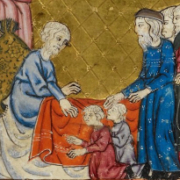Vayechi: angels, memory, blessing
This week’s Torah portion, Vayechi, begins with Jacob on his deathbed. Joseph comes to him with his sons Ephraim and Menashe, and Jacob marvels: he hadn’t expected to see Joseph again, and now here he is with Joseph and the next generation too! He blesses the boys with a verse (Genesis 48:16) that became part of the liturgy of the bedtime shema — “May the angel who kept me from harm, bless the ones who come after,” in Reb Irwin Keller’s beautiful translation that we sang this morning.
The syntax of this verse is unclear. Rashi reads it in a literal, non-mystical sense. He thinks Jacob is talking about the angel whom God sent to wrestle with him at the banks of the Jabbok. But many translations capitalize Angel, because the way the sentence is phrased makes it seem as though Jacob is referring to God as an Angel, both a protector and a source of blessing. As Reb Irwin writes, “So he could mean a guardian angel, or he could mean God, or he could intend the ambiguity, knowing that angels are just a face of the Divine anyway.”
Reading these verses this year, I couldn’t help remembering last February when I took my son to Texas to say goodbye to my mother. I knew when we flew down that it would be our last time seeing her alive.
While we were there, she soaked up every moment she could with her youngest and final grandson. She managed to get out of bed once to sit with him while he ate dinner. I remember that she asked him about his favorite cartoon — an anime called Pokémon, which was completely foreign to her, but he happily told her all kinds of details about the various Pokémon and their evolutions. And — this is a story I told in my Yom Kippur sermon, Come… and Prepare to Go — she came downstairs for that final Shabbat, and heard him sing the words of the kiddush over wine one last time.
My mom didn’t use the language of “blessing” each other, and angels were not part of her Judaism. They were as foreign to her as Pokémon. But I think her presence with her generations that Shabbat was the blessing she was able to give us from her deathbed. She spent the last of her strength making it to her wheelchair to come downstairs for Shabbes dinner because celebrating Shabbat with her children and grandchild mattered to her. She showed us with her actions that family and Jewish tradition had been a blessing for her that she hoped would continue to be a blessing for us.
Her unveiling approaches in two weeks. I still think of her every week when I make challah, remembering that she tasted my homemade challah on that last Shabbes of her life and declared it good. And my son remembers her when we make kiddush on Friday nights, because he was proud of being able to sing those words where she could hear. In these ways she’s still with us even though she’s gone. Sometimes I imagine that she peeks in at our Shabbes table each week, like the two angels described in Talmud who seem able to say only one thing: “May next week be just like this one.” Even on the weeks when we only spend a few minutes over candles and wine and challah, I like to imagine that she feels joy when she sees us carrying this tradition forward.
Before he dies, Jacob reminds Joseph that he wants to be buried in the same place where his parents are buried. Joseph gets Pharaoh’s permission to travel, and then Joseph carries Jacob’s bones back to the Cave of Machpelah before returning to Egypt.
Later in Torah, this carrying of bones will be recapitulated. Moshe will take Joseph’s bones out of Egypt when the children of Israel depart. The word used in that verse (Exodus 13:19) is etzem, which means both bone and essence. I see a deep truth in these two parallel stories. No matter where our forebears are buried, we carry their essence with us. Like Joseph, and like Moshe, we carry our forebears with us. Sometimes their physical features reverberate through the generations. Sometimes their traumas, their memories, and their stories live on in us. And that’s true whether or not those whom we remember were good to us, whether or not they could be be the parents or grandparents we needed them to be. We carry both the bitter and the sweet.
May the memories of those whom we carry — in our minds and hearts, and sometimes also in our DNA — be the blessing that we need in our lives. May they inspire us to live up to our best selves. May they help us shed any baggage, any hurts, so we can grow beyond them and not transmit them further. May we experience their memories as a blessing for us… so that we can transmit that blessing in turn to those who come after, our children and the children of our children. Or in the rabbinic reinterpretation, our students and their students and the students of our students. So that all of us can experience ourselves as part of a chain of generations and a chain of blessing, watched-over by that same angel (or Angel) whom Jacob evoked so long ago.
This is the d’varling that Rabbi Rachel offered at CBI on Shabbat morning (cross-posted to Velveteen Rabbi.) Image from the Golden Haggadah.






